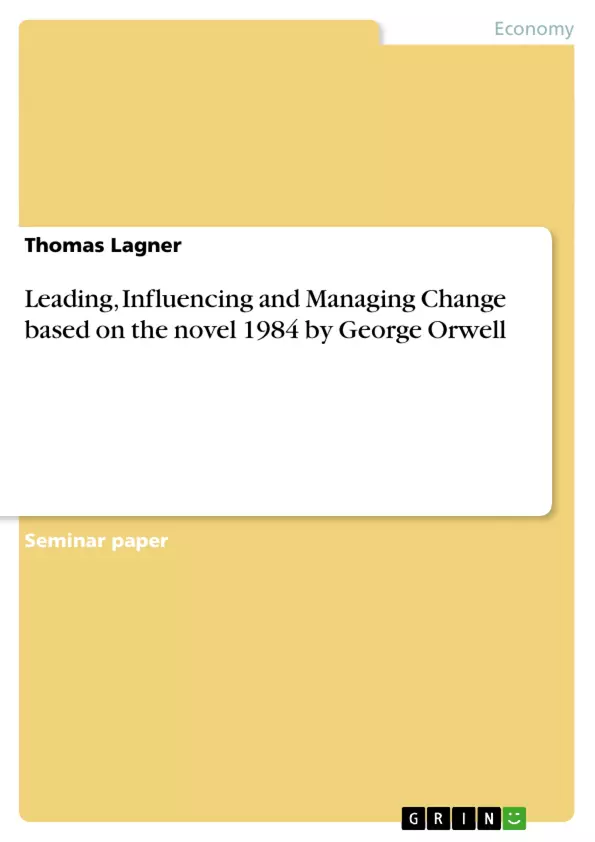"Never doubt that a small group of thoughtful, concerned citizens can change the world. Indeed it is the only thing that ever has" Margaret Mead once stated. Her statement exactly expresses why the peaceful revolution of 1989 in former East Germany was successful in not only changing the political system from totalitarian socialism into a real democracy but also re-uniting West- and East Germany: the people overcame the government. Beyond this, it also explains why Winston Smith, the main character and rebel in George Orwell’s novel 1984 failed in the battle against the totalitarian regime under which he lived: he was not the “people” and only part of a group of two. Consequently, the goal of this term paper is to develop implications for leading change based on my readings. First of all, I will give a summary of the novel 1984 written by George Orwell. In the second part of this paper, I will draw a comparison between the scenario of 1984 and the real world example of former East Germany in 1989 to underline the applicability of the leadership implications given later. After this distinction, I will analyze the different leadership styles of the key characters Winston Smith (rebel) and O’Brien (the system) in 1984 as well as of Reverent Christian Führer (the rebel) in 1989 who initiated indirectly over a time frame of six to nine years the peaceful revolution in the former German Democratic Republic
(GDR). As for the counterrevolution in the GDR, I will point out briefly how the system as a whole tried to prevent the collapse of the nation. This paper ends with a conclusion.
Inhaltsverzeichnis (Table of Contents)
- (I) Introduction
- (II) Summary of 1984
- The World of Oceania
- Winston Smith and the Party
- The Brotherhood
- Winston and Julia's Rebellion
- The Ministry of Love
- The End of Winston
- (III) Comparing the general situation of 1984 with 1989
- (IV) Analysis of the change initiatives in 1984 vs. 1989
- (a) Understanding and recognizing change: the appreciation stage
- (b) Preparing change: the influence stage
- (c) Implementing change: the control stage
- (V) Conclusion
Zielsetzung und Themenschwerpunkte (Objectives and Key Themes)
This term paper analyzes the novel 1984 by George Orwell, drawing parallels to the peaceful revolution in East Germany in 1989, and exploring its implications for leading change. It aims to identify leadership strategies for both successful and unsuccessful revolutions.
- The Nature of Totalitarianism and Control
- The Importance of Individual Freedom and Thought
- The Role of Leadership in Social Change
- The Dynamics of Power and Resistance
- The Impact of Information Control and Propaganda
Zusammenfassung der Kapitel (Chapter Summaries)
The paper begins by summarizing the plot of 1984, depicting the totalitarian society of Oceania ruled by Big Brother. Winston Smith, the protagonist, rebels against the oppressive regime, yearning for freedom and seeking to join the fabled Brotherhood. His relationship with Julia, a fellow rebel, ultimately leads to their downfall, highlighting the dangers of individual resistance against a powerful state. The paper then compares the scenario of 1984 with the events of 1989 in East Germany, focusing on the similarities in economic, social, and political structures. The paper continues to analyze the different leadership styles of Winston Smith, O'Brien, and Reverend Christian Führer, highlighting the strategies employed by both revolutionaries and the ruling system. It explores the complexities of understanding, preparing, and implementing change, examining how individuals and systems respond to societal pressures and strive for control.
Schlüsselwörter (Keywords)
This paper focuses on key concepts such as totalitarian regimes, individual freedom, change leadership, societal control, propaganda, resistance, revolution, and social transformation. It examines the dynamics of power, resistance, and the role of leadership in shaping social change, drawing parallels between the fictional world of 1984 and the real-world example of the 1989 revolution in East Germany.
Frequently Asked Questions
What is the main objective of this paper?
The paper aims to develop implications for leading change by comparing George Orwell's novel "1984" with the real-world example of the 1989 peaceful revolution in East Germany.
Why does the author compare "1984" with East Germany in 1989?
The comparison highlights the applicability of leadership strategies in totalitarian contexts, showing why Winston Smith failed in fiction while the people of the GDR succeeded in reality.
Which leadership styles are analyzed in the document?
The analysis includes the styles of Winston Smith (rebel), O’Brien (the system), and Reverend Christian Führer, who was a key figure in the 1989 revolution.
What are the three stages of change mentioned in the paper?
The paper categorizes change initiatives into three stages: the appreciation stage (recognizing change), the influence stage (preparing change), and the control stage (implementing change).
What key themes are explored in the context of totalitarianism?
Key themes include individual freedom, the dynamics of power and resistance, propaganda, and the role of information control in social transformation.
- Citation du texte
- Thomas Lagner (Auteur), 2006, Leading, Influencing and Managing Change based on the novel 1984 by George Orwell, Munich, GRIN Verlag, https://www.grin.com/document/62148



